Are you ready to embark on a journey towards a healthier you? The key to achieving overall well-being and vitality lies in crafting a well-balanced diet that nourishes your body and fuels your ambitions.
A wholesome diet is not about deprivation; it’s about making thoughtful choices and enjoying various delicious and nutritious foods. So, let’s dive into the ultimate guide to creating a balance diet that will lead you to a happier, healthier, and more energized life.
Understanding the Basics: What is a Well-Balanced Diet?
A balance and healthy diet is a nutritional approach that provides your body with the right mix of essential nutrients, vitamins, minerals, and macronutrients to function optimally. It’s all about striking the perfect balance between various food groups to ensure you get the nourishment you need before indulging in any category.
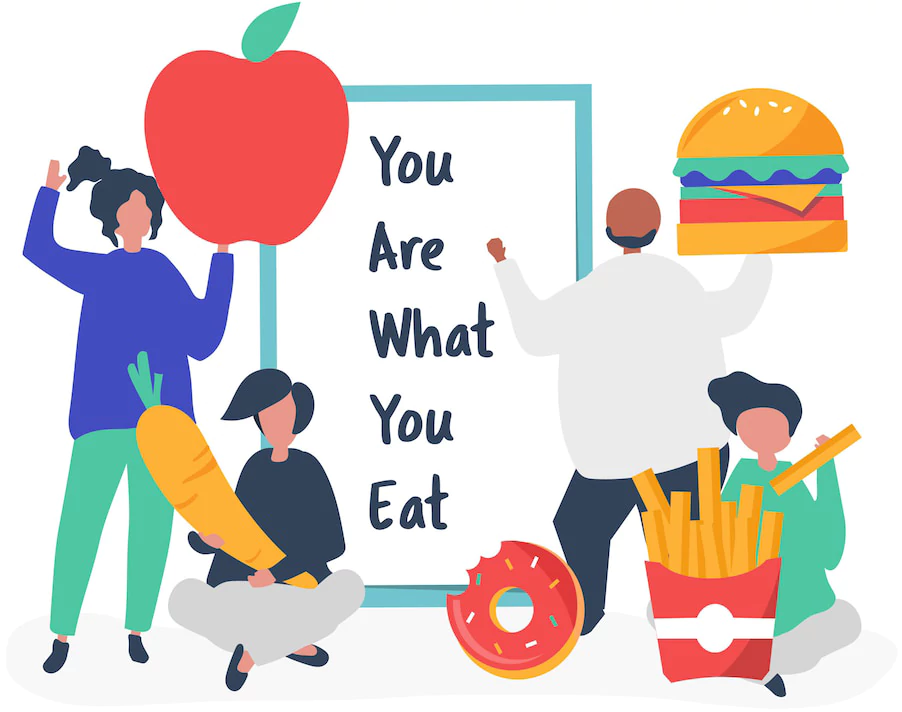
The Foundation: Nutrient-Dense Foods
At the heart of a healthy diet are nutrient-dense foods. These powerhouses pack a punch of vitamins, minerals, fiber, and antioxidants while being relatively low in calories. Leafy greens, colorful vegetables, whole grains, lean proteins, and fresh fruits are the stars of this show. They are incredibly good for you and add a burst of flavor and texture to your meals.
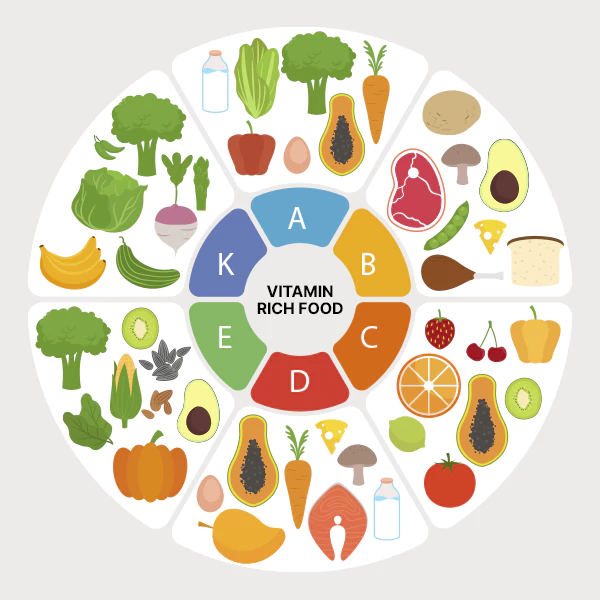
Let’s discuss some essential nutrients and what foods you can eat to meet your daily nutrient needs.
Protein
The average adult needs about 0.8 of protein per kilogram of body weight. For example, if you weigh 68 kilograms (150 pounds), you would need approximately 54 to 68 grams of protein per day.
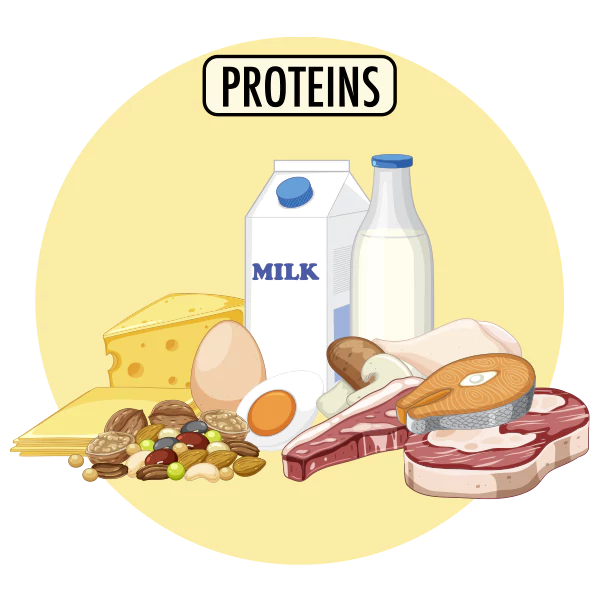
Good sources of protein include lean meats like chicken, turkey, and fish. Plant-based options like beans, lentils, tofu, and quinoa are also excellent choices for vegetarians and vegans.
Carbohydrates
Strive to make carbohydrates a significant portion of your diet, about 45-65% of your daily caloric intake. This translates to about 225 to 325 grams of carbohydrates per day.
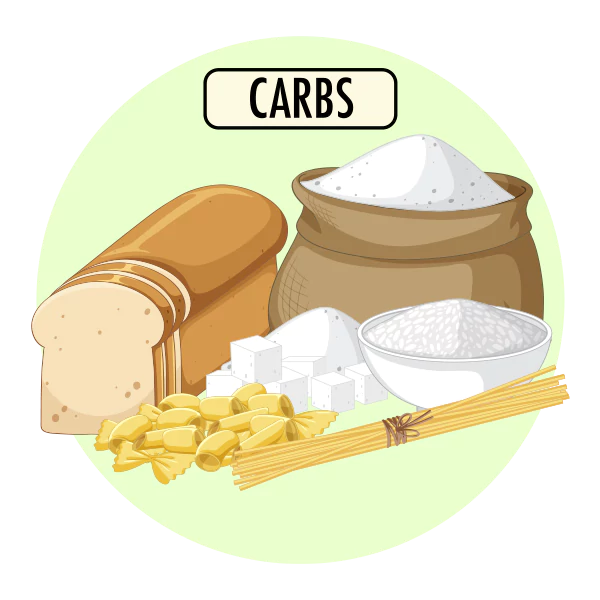
Opt for complex carbohydrates found in whole grains, fruits, vegetables, and legumes, which provide a steady release of energy and essential nutrients.
Healthy Fats
The recommended intake of fats is about 20-35% of your daily caloric intake. For example, on a 2,000-calorie diet, this would mean consuming approximately 44 to 77 grams of healthy fats per day. Of this, try to get a significant portion of Omega-3 fatty acids, such as 250-500 milligrams of EPA and DHA combined.
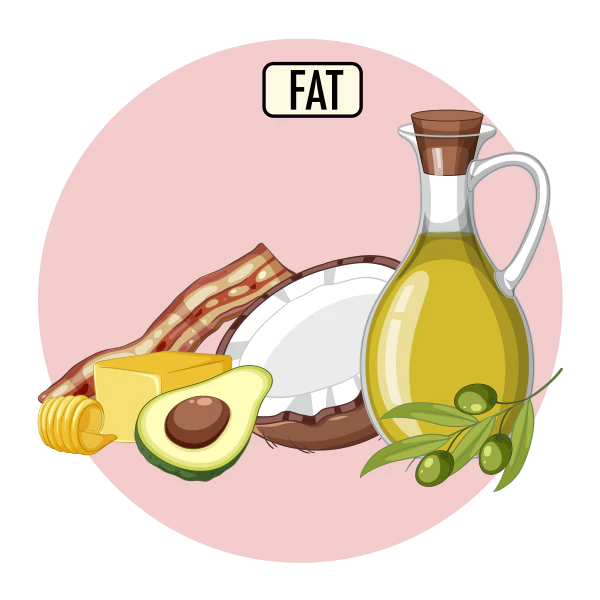
Avocados, nuts, seeds, and olive oils are the best sources of healthy fats. Moreover, try to incorporate fatty fish like salmon and chia seeds in your diet to consume significant amount of omega-3 fatty acid daily.
Fiber
Women should aim for about 25 grams of fiber per day, while men should target around 38 grams. So, aim to consume a mix of soluble and insoluble fiber from various sources like fruits, vegetables, whole grains, and legumes to meet your specific needs.
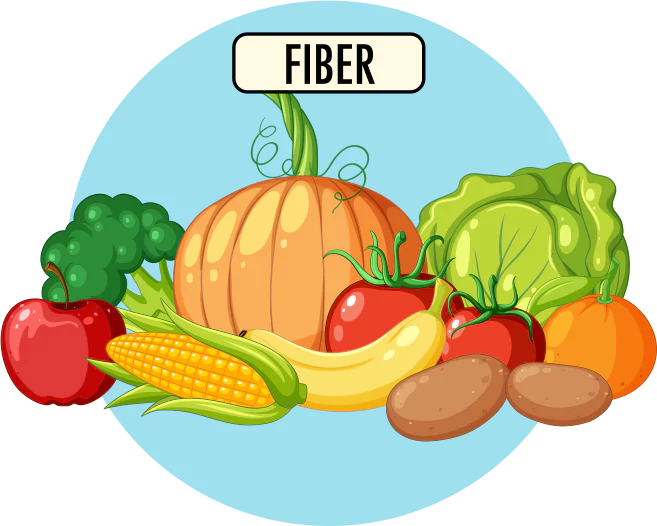
Vitamins
The specific quantities of vitamins needed vary widely depending on the nutrient and individual factors like age and sex.
For example, the recommended daily intake for Vitamin D is about 600-800 IU (International Units) for most adults, but it may vary based on factors such as sun exposure and individual health conditions.
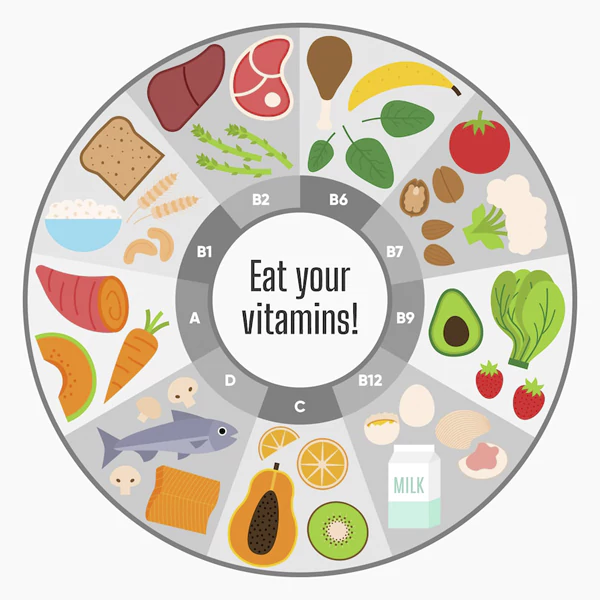
Additionally, incorporating a diverse range of colorful fruits and vegetables into your diet is an excellent way to ensure you’re getting a wide array of vitamins.
Minerals
Like vitamins, the amount of minerals you need to incorporate in your diet depends on different factors like age, sex, and health conditions.
For example, in case of minerals like calcium and potassium, the recommended daily intake is approximately 1,000-1,300 milligrams for calcium and 2,600-3,400 milligrams for potassium.
To get a variety of minerals, include foods like dairy products, leafy greens, nuts, seeds, and whole grains in your diet.
Moderation: A Balanced Approach to Treats
Indulgence is a part of life, and a well-balanced diet embraces it too. The key is moderation. Allow yourself occasional treats and enjoy your favorite desserts or snacks guilt-free. Savor the flavors, and remember that it’s about the overall balance of your diet.
Portion Control: Listen to Your Body
Portion control plays a vital role in maintaining a healthy diet. Listen to your body’s hunger cues, and eat until you feel comfortably satisfied. It’s not about restricting yourself but being mindful of your body’s needs.
The Art of Meal Planning
Planning is the secret sauce to maintaining a balance diet, especially in our fast-paced lives. Take some time each week to plan your meals and snacks. Include a variety of nutrient-dense foods, and don’t forget to mix up your recipes to keep things exciting.
Smart Substitutions: Upgrading Your Favorites
Transforming your favorite dishes into healthier versions is a fun way to maintain a well-balanced diet without sacrificing flavor. Swap refined grains for whole grains, use Greek yogurt instead of sour cream, or choose baked over fried options. These simple substitutions can make a significant impact on your health journey.
Mindful Eating: Slow Down and Savor
We frequently rush through meals in our busy lives instead of taking the time to appreciate the flavors and textures of the food. Eat mindfully by taking time, putting away distractions, and slowing down. Consider each bite carefully and savor the act of feeding your body.
Meal Prepping: Your Time-Saving Ally
Meal prepping is a game-changer for those leading hectic lives. Dedicate some time on the weekend to prepare nutritious meals and snacks for the week ahead. This will save you time and ensure that you always have healthy options on hand, making it easier to stick to your diet plan.
Seeking Professional Guidance
If you need help figuring out where to start or need personalized advice, consider seeking guidance from a registered dietitian or nutritionist. They can help you create a tailored diet plan that aligns with your goals and health needs.
Feel Joy of Experimentation
Finally, remember that a healthy diet is not set in stone. Embrace the joy of experimentation as you discover new recipes, flavors, and combinations that excite your taste buds and keep you on track with your health goals.
Navigating Social Settings and Special Occasions
Social gatherings and special occasions are opportunities to celebrate and connect with loved ones. While indulging occasionally is okay, you can still stay true to your well-balanced diet. Choose smaller portions of your favorite treats, fill your plate with colorful veggies, and savor each bite mindfully. Remember, it’s about balance, and a wholesome diet allows room for occasional indulgence.
Incorporating Superfoods: Nutritional Powerhouses
Superfoods are nutrient-rich foods that offer a myriad of health benefits. Incorporating these nutritional powerhouses into your diet can elevate its overall nutritional value. Consider adding berries for antioxidants, leafy greens for vitamins, and chia seeds for omega-3 fatty acids. Superfoods can add an extra boost to your wholesome diet and contribute to your overall well-being.
The Importance of Rest and Recovery
A well-balanced diet is about what you eat and how you care for your body. Rest and recovery are crucial components of overall health. Ensure you get enough sleep each night, as it allows your body to recharge and repair. By prioritizing rest and recovery, you will have the energy and motivation to stick to your diet.
Building a Support System: Accountability and Encouragement
Embarking on a healthy diet journey can be more enjoyable with a support system. Connect with like-minded individuals who share similar health goals. Whether it’s joining a cooking club, attending wellness workshops, or simply having a friend to swap healthy recipes with, a support system can provide accountability and encouragement.
Celebrate the Journey
Crafting a balance diet is not about perfection or rigid rules. It’s about embracing a lifestyle that nourishes your body, mind, and soul. Celebrate your progress, no matter how small, and be patient with yourself as you learn and grow. You are one step closer to a healthier you with each mindful choice and healthy habit.
Bottom Line
A well-balanced diet is not a temporary fix but a lifelong commitment to nourishing your body and mind. By incorporating nutrient-dense foods, balancing your macronutrients, practicing portion control, and staying hydrated, you’ll pave the way for a healthier and happier you. Embrace the journey, and enjoy the benefits of a healthy diet as you flourish into the best version of yourself. Cheers to your health and well-being!
Recommended Read: Yoga and Weight Loss: How Yoga Can Help You Reach Your Fitness Goals



